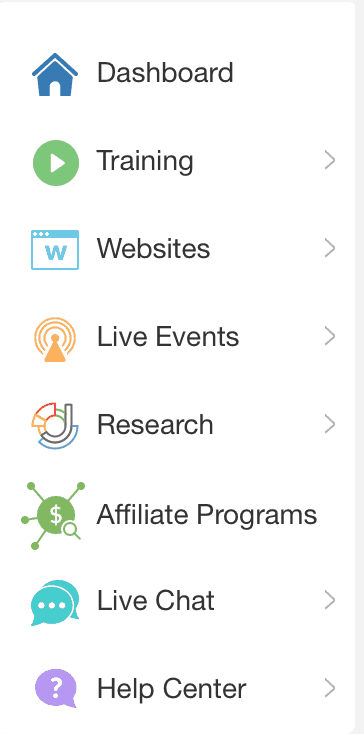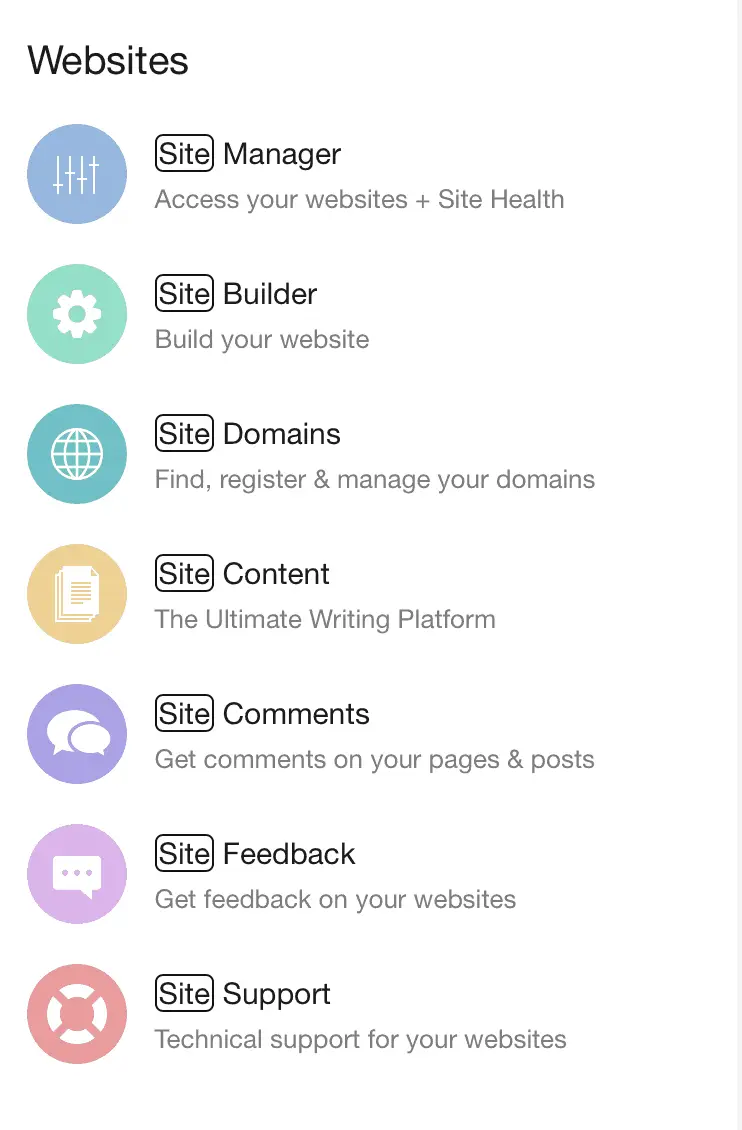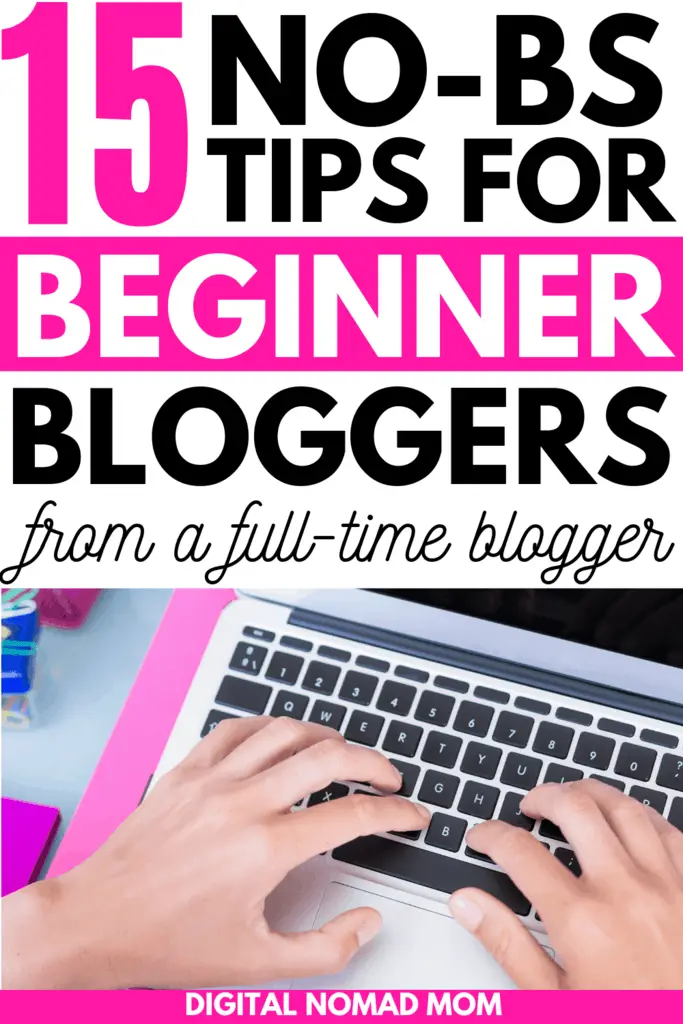This post contains affiliate links, which means I may receive a small commission, at no cost to you, if you make a purchase through a link.
Without a doubt, starting my first blog back in August 2016 was one of the best decision I ever made. I met my initial income goal of $1000/month in less than 6 months, and it’s only grown from there.
Blogging has become a popular endeavor, with a lot more information/courses/training available now, compared to when I first got started. This is is great, but it can also be a negative. Information overload is real and overwhelming.
Additionally, how do you know that the person who’s sharing their advice has actually made money blogging? Unfortunately, there are a lot of people who start blogs about “how to make money blogging” when they’ve never actually made money blogging. Sounds unbelievable, but it’s true.
That’s why I decided to write this post on my best blogging tips for beginners. I’m a full-time blogger and have been blogging for almost 3 years. Of course, there are people who make more money than I do.
But if your goal is to make money blogging and learn from someone who actually does that every day, then keep reading.
Blogging Tips for Beginners

1. Choose a Niche
The first thing you’ll want to do before you start your blog is to choose your niche. Your niche is the topic all of your blog content is based around. e.g.”Weight Loss” or “Parenting” or the specific audience you’re going to be targeting i.e. “New Moms” or “Retirees.”
The amazing thing about starting a blog is that the options for a niche are endless. However, I would recommend choosing a niche on a topic that you’re either an expert at, enjoy talking (or writing) about, or a topic that you’re interested in learning more about.
Additionally, once you’ve chosen a niche don’t feel locked into it. Most bloggers find that their blog grows and evolves as time goes on.
For example, you might start a blog in the parenting niche, but find that you really like writing about ways to help parents save money, so your niche narrows from general “parenting” to “frugal living for families.”
That’s completely fine (and completely normal!)
2. Get Your Own Domain Name/Hosting
Blogging is one of the most inexpensive businesses you can start, with the potential for an amazing return on investment.
Having said that, if you’re serious about making money from your blog, you will need to be willing to spend a small amount of money. Have you heard the expression “you need to spend money to make money?” Blogging is no different, except with blogging, you can spend a small amount of money and potentially make a lot.
One of the first small investments you’ll need to make is to get your own domain name and hosting.
Your domain name is the web address that people will type into their internet browser when they want to visit your site. For example, my domain name is www.digitalnomadmom.com
Hosting is the place where all of the files and folders that make up your website live. When someone types in your domain name, this is where they’ll be taken. Every single website requires hosting.
There are hundreds of hosting companies, and as your website grows your needs may change.
However, for beginners I have two recommendations:
#1 Recommendation: Wealthy Affiliate – Wealthy Affiliate is a training program and community for bloggers and affiliate marketers. Additionally, when you’re a Wealthy Affiliate member, you have the opportunity to create up to 50 websites using the Wealthy Affiliate hosting. This is the option I recommend to most people, because you’ll not only have fast and reliable hosting, you’ll get access to hundreds of free themes, premium training programs and the entire Wealthy Affiliate community.
Runner Up: Bluehost – Bluehost is a good starter web host. It’s cheap (only $3.95/month) and you’ll get a free domain name.
3. Install WordPress
WordPress is the publishing platform that I use and personally recommend to all bloggers. Over 76 million websites and blogs are powered by WordPress and this number grows every day.
WordPress is free to use, easy to customize with thousands of beautiful themes, safe and secure and SEO friendly.
Fortunately, Wealthy Affiliate provides an easy, 1-click install which means you can get your WordPress blog up and running in minutes.
Simply log into your Wealthy Affiliate account, click on “Websites” in the side menu (pictured below) and then “Site Builder” and follow the step-by-step instructions.


Alternatively, Bluehost also has an easy 1-click WordPress install.
4. Install Essential Plugins
There are countless plugins, both free and premium, available to customize your WordPress website, and it can be tempting to go on a “plugin downloading spree.”
I don’t recommend doing this, as having too many unnecessary plugins can slow down your site and make it vulnerable to attacks.
However, there are a few essential plugins that I recommend you install immediately. These can all be found by searching in the “plugins” section of your WordPress dashboard:
Akismet – anti-spam plugin that blocks spammy comments
Contact Form 7 – a simple, lightweight contact form plugin
Yoast – a popular, easy-to-use SEO plugin that helps you optimize your blog posts for search engines
Social Pug – a social sharing plugin that allows people to easily share your content on social media
5. Claim Social Media Accounts
While I don’t recommend trying to build a social media following on multiple platforms at once, I do recommend at least setting up accounts on all of the main social platforms. It’s a good idea to claim your blog name (if it’s still available.)
I recommend claiming your blog name on the following platforms: Facebook, Pinterest, Twitter, Instagram, YouTube and TikTok.
6. Write Your About Page
Your about page is one of the most visited pages on your blog so it’s important that you write an engaging and entertaining about page.
If someone clicks over to one of your blog posts via Google and Pinterest and likes what they see, they’re very likely to click over to your about page to learn more about you/your blog.
This is your perfect opportunity (and possibly your only opportunity) to turn a casual reader into a fan/follower.
Oftentimes, people find their about page to be the most difficult piece of content they write. It’s not easy writing about yourself in a way that makes people want to follow you!
But here’s the thing – people WANT to learn more about you, and the more interesting, engaging and entertaining you can make yourself and your blog sound, the more likely you are to gain a follower. And that’s exactly what you want.
To start, I recommend doing a brain dump of the following:
- Your blog topics
- Why you started the blog
- What you know about your niche
- Random, interesting facts about you
Don’t worry about spelling or grammar. Just immediately write down every thought that pops into your head.
Spend 15 minutes doing this and you’ll realize that you have a wealth of content you can use to write your about page.
Once you’ve finished your brain dump, compile that information together coherently to form the content for your about page.
Here is my about page for inspiration.
7. Write Disclaimer, Disclosure and Privacy Policy Pages
To make sure you’re abiding by FTC guidelines, it’s very important that you have disclaimer, disclosure and privacy policy pages on your blog.
These pages are often either overlooked by beginner bloggers or filed away in the “I’ll do that later” category. However, I’d encourage you to do it now so you’re in compliance with the FTC.
I recommend getting an attorney-approved terms & conditions template that you can edit and customize with your own personal information.
Additionally, if your blog collects any personal information like names or email addresses (e.g. if you have an email list) or if you use cookies on your site (e.g. you use affiliate links) then you’ll need a privacy policy page that lets your readers know what information you collect and what you do/don’t do with this information.
You can use this free privacy policy generator for your privacy policy.
8. Schedule Time to Blog
One of the biggest keys to my success in making a full-time income blogging is the fact that, from Day 1, I scheduled time to blog. A blog planner is absolutely necessary to keep organized!
When I started my first blog back in August 2016, I was a new mom. My son was only a few months old, my husband was away for work and I had no family or friends nearby to help out (in fact, my family lives all the way in Australia!)
I had every reason to just decide I wasn’t going to blog that week, or that month because I was in a constant sleep-deprived state and would have loved nothing more than to collapse onto the couch and sleep for 20 hours.
But even when the going got tough, I always scheduled time to blog.
For a few months, that meant strapping my son in his stroller, driving to a local walking trail and walking 5 miles while working on my blog from my iPhone.
The point is that you’re not going to earn a full-time income (or any income) if you don’t dedicate time to actually work on your blog.
9. Invest in Your Education
I strongly recommend that all bloggers (regardless of your experience level) invest in their blogging education.
I truly believe this was another key to my success. I viewed my blog as a business from day 1. A business I knew absolutely nothing about, so of course, I invested in educating myself.
There are hundreds of blogging courses with many of them costing up to $1000 (or more.) The good news is, my top 3 recommendations cost nowhere near that amount (in fact, if you got all 3 right now, you’d only pay a total of $71.99 (and my top recommendation is FREE to get started.)
These are my top 3 recommendations:
Wealthy Affiliate – The #1 recommendation I have for anyone who wants to build a profitable, sustainable income through blogging. Wealthy Affiliate is actually a lot more than a blogging course – it’s also an active, knowledgeable community of bloggers who are always willing to help and share advice/knowledge. And the best part – you can get a starter membership to Wealthy Affiliate for FREE.
Pinterest Marketing Secrets – This is a comprehensive course that outlines my entire strategy for getting hundreds of thousands of pageviews to my various blogs every single month. Pinterest can be a goldmine for pageviews, but you have to know how to use it properly. Pinterest Marketing Secrets teaches you exactly that (use the code PMSDISC to enroll for just $12.99)
Stupid Simple SEO: I highly recommend you implement an SEO strategy from day one. It is the best way to drive traffic to your blog, but can be intimidating because there is so much info out there. Mike Pearson’s Stupid Simple SEO course is a great way to start learning and is extremely valuable. Read my full Stupid Simple SEO Review.
10. Let Your Personality Shine Through
The reason people enjoy reading blogs is because blogs are written by a “real” person. If you can connect with and build a relationship with your readers through your blog posts, you’ll be much more likely to gain a following, increase your page views and convert affiliate offers.
The best way to connect with your readers is to let your personality shine through in your blog posts.
Often, people tend to water things down or attempt to stifle their personality or feelings in fear of putting off some people. The problem with taking that approach is if you try to please everyone, you won’t please anyone.
Sure, you’re probably going to turn some people off. But you’re also going to attract people who love your personality, and that’s exactly what you want.
11. Do Keyword Research
If you want to build a long-term, sustainable income with your blog, then keyword research is essential.
If you’re not familiar with keyword research, it’s basically the process of searching for keywords that you’d like your blog post to rank for in search engines.
For example, in this post about how to get a free Starbucks, the keyword I want to rank for in search engines is “how to get a free Starbucks.”
As you can see from the screenshot below, this is what happens when I type that keyword into a popular search engine:

That’s the link to my article on page 1 of the search results. That’s exactly what you want to happen with every blog post you write.
Of course, you’re not always going to rank your keywords, and they’re not always going to land on the first page.
However, that should be your goal.
To do keyword research, you’ll need a keyword research tool. This is my #1 recommendation:
Jaaxy – this keyword research tool was created by the founders of Wealthy Affiliate and if you’re a premium WA member, you’ll have free access to the lite version of Jaaxy (which is more than enough in the beginning.)
I personally love to use Keysearch as it is very inexpensive and uses the Google API so the results are relatively accurate (note no keyword research tool is perfectly accurate).
12. Utilize Pinterest
If you don’t have a Pinterest account, I recommend starting one now. Pinterest can be an excellent way to get thousands of free page views to your blog, with the vast majority of niches having the potential to do very well on Pinterest.
Succeeding on Pinterest does require that you have a strategy. It’s not enough to log in a couple of times a week and pin a few things here and there.
Having said that, I believe that a lot of bloggers overcomplicate the process with elaborate pinning strategies, tracking spreadsheets, etc.
I like to keep things simple (and automated.) The process I use takes very little time to set up and maintain, but I still get hundreds of thousands of free page views every month.
Pinterest Marketing Secrets is the course I created to teach bloggers my exact strategy. I haven’t left anything out – this is the complete strategy I use for every one of my sites.
You can enroll in Pinterest Marketing Secrets for just $12.99 using the code: PSMDISC
13. Stay Consistent
Staying consistent with your blogging is very important. While I don’t believe it’s essential to have a set publishing schedule (i.e. every Monday and Wednesday at 9am) it IS important that you’re regularly publishing blog posts.
From an SEO perspective, search engines tend to favor sites that are regularly updated. This doesn’t mean you have to be publishing a new blog post every day, but it does mean that you should be updating your site on a regular basis.
From a reader perspective, once you start to gain a following, people will start to check back to see if you’ve published new content. If they go two weeks without seeing anything new, there’s a good chance they’ll tune out.
From a Pinterest perspective, Pinterest highly favors new, fresh content. This means that your new blog posts and pins are more likely to be promoted by Pinterest’s algorithm.
From a monetization perspective, it makes sense that 50 targeted, well-written and well-monetized blog posts is going to make you more money than 10 blog posts.
Important to note – while it’s important to stay consistent with your publishing, always remember to focus on quality over quantity. One well-written, well-researched blog post is better than 5 poorly written, slapped together posts.
Related: Blogger Networks to Join to Make Money
14. Ask Questions
As a beginner blogger, you’re facing a fairly steep learning curve. As soon as you feel like you’ve got a handle on things, you’ll discover a new concept or strategy, or a new challenge will arise.
When things get overwhelming or you feel stuck, don’t be afraid to ask questions. My favorite place to go for advice, support and inspiration is the Wealthy Affiliate community.
Additionally, always remember that Google is your friend.
15. Don’t Quit
I’ve saved this one until last, but it’s quite possibly the MOST important key to success.
The people who quit are GUARANTEED to fail.
Blogging is my dream job. I get to work from home, own my own mini publishing platform, write all day (I’ve always loved writing) and never have to answer to a boss.
But the road hasn’t always been easy, especially in those beginning stages.
It takes time to make money blogging. You’ll need to dedicate yourself to your blog for at least 6 months (on average) before you start to see any income (and even then, it’s going to be pretty low.)
I understand the temptation to quit and get a “regular job” but I’d encourage you to think about what the future might look like if you push through the hard times.
A year is going to pass whether you continue working on your blog or not. But imagine how you might feel if you keep going and start making an extra $500, $1000 or even more every month from your blog.
There you have it – those are my top 15 tips for beginner bloggers. Implement all 15 of these and you’re on your way to making an income from your blog.

binance Registrācijas bonusa kods
Wednesday 28th of May 2025
I don't think the title of your article matches the content lol. Just kidding, mainly because I had some doubts after reading the article.
Create a free account
Monday 17th of February 2025
Thanks for sharing. I read many of your blog posts, cool, your blog is very good.
100 USDT
Thursday 30th of January 2025
I don't think the title of your article matches the content lol. Just kidding, mainly because I had some doubts after reading the article.
create binance account
Sunday 12th of January 2025
I don't think the title of your article matches the content lol. Just kidding, mainly because I had some doubts after reading the article.
Registrera dig
Thursday 26th of December 2024
Thank you for your sharing. I am worried that I lack creative ideas. It is your article that makes me full of hope. Thank you. But, I have a question, can you help me?